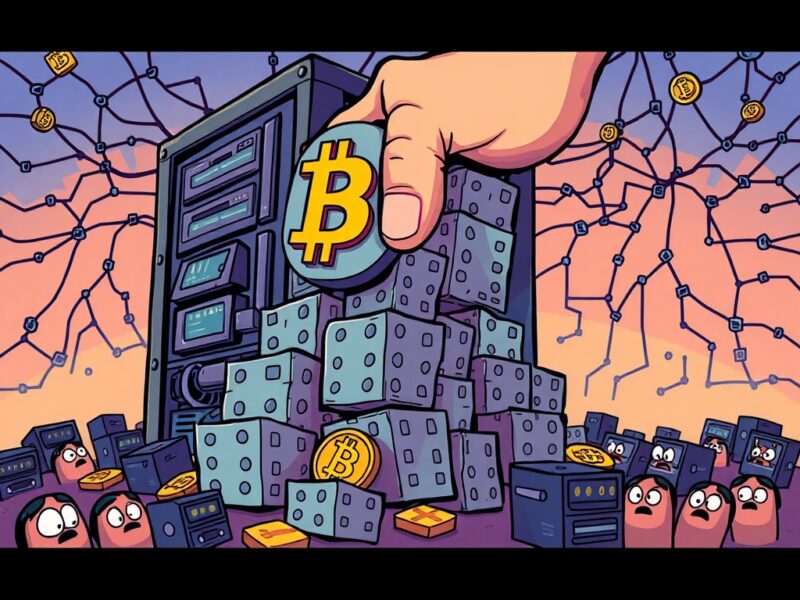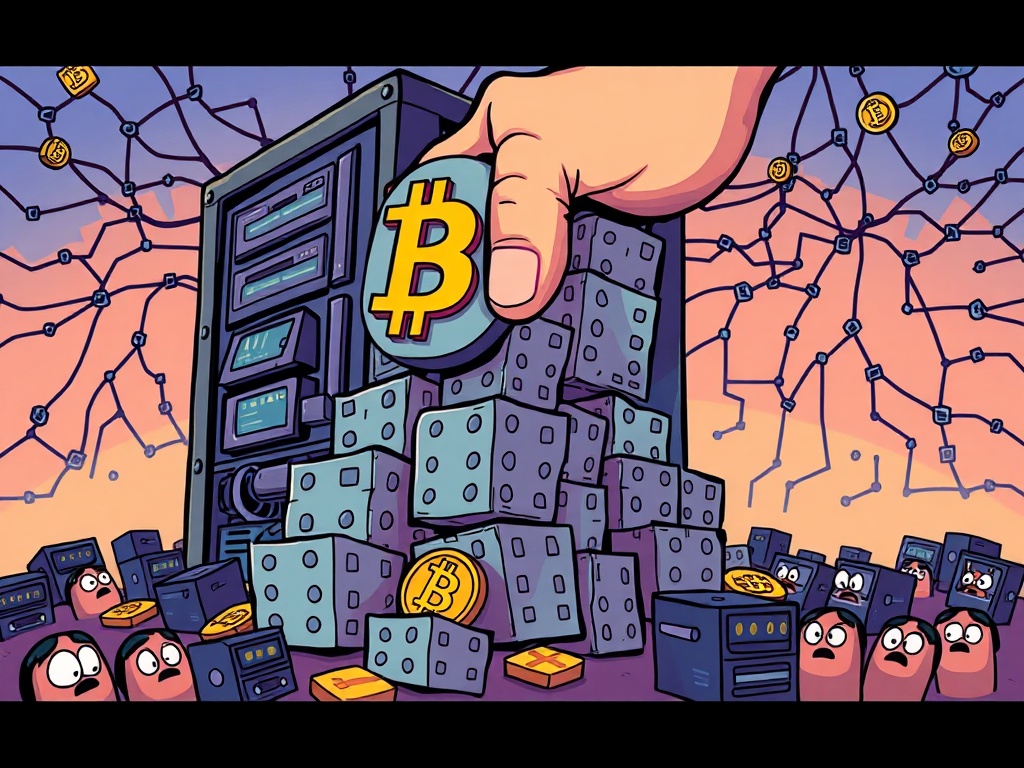Urgent Warning: Foundry USA’s Block Spree Fuels Alarming Bitcoin Centralization Fears
0
0

BitcoinWorld

Urgent Warning: Foundry USA’s Block Spree Fuels Alarming Bitcoin Centralization Fears
The cryptocurrency world is abuzz with a significant development that has many long-time Bitcoin users feeling uneasy. Recent reports highlight how a single entity, U.S.-based mining pool Foundry USA, successfully mined eight consecutive Bitcoin (BTC) blocks. This unprecedented streak has ignited fresh discussions and reignited long-standing concerns about Bitcoin centralization, a topic vital to the network’s foundational principles.
What Does Foundry USA’s Block Spree Mean for Bitcoin Centralization?
Jacob King, an astute analyst at the crypto newsletter WhaleWire, recently voiced his alarm on X regarding Foundry USA’s remarkable mining run. He described it as a serious centralization issue, echoing the sentiments of many in the Bitcoin community. This event underscores the ongoing challenge Bitcoin faces with miner concentration, a situation where a few large pools control a significant portion of the network’s hash rate.
For Bitcoin, decentralization is not just a buzzword; it is the very essence of its security and censorship resistance. When a single entity or a small group gains too much control over block production, it introduces potential vulnerabilities. These could range from the theoretical risk of a 51% attack to more subtle forms of influence over transaction validation and network upgrades.
Why Are Consecutive Blocks a Concern for Decentralization?
Mining eight blocks in a row, while technically possible through sheer luck, amplifies fears about concentrated power. It raises questions about the distribution of mining power and its potential impact on the network’s integrity. While a pool mining multiple blocks consecutively doesn’t inherently mean malicious intent, it certainly highlights a lack of broad distribution in block production.
The core issue here revolves around trust. Bitcoin was designed to be a trustless system, meaning users do not need to rely on any single authority. High levels of Bitcoin centralization in mining can erode this fundamental principle, forcing users to place more trust in the dominant mining pools. This goes against the very ethos of a decentralized digital currency.
Beyond Blocks: What Other Indicators Point to Centralization Risks?
King’s observations extended beyond just the block streak. He also pointed to other worrying signs: empty blocks and plunging transaction fees. An empty block is a block that contains no transactions, or very few, which can sometimes occur if a miner finds a block quickly and propagates it without waiting to fill it with transactions. While not always indicative of centralization, a rise in empty blocks can suggest inefficient mining practices or, in some contexts, a miner prioritizing speed over transaction inclusion.
Plunging fees often reflect weakening network activity. When fewer people are transacting on the network, the demand for block space decreases, leading to lower fees. Combined with miner concentration, these factors paint a picture of a network potentially experiencing shifts in its operational health and raising further questions about Bitcoin centralization.
How Can the Community Address Bitcoin Centralization?
Addressing Bitcoin centralization is a complex, ongoing challenge that requires a multi-faceted approach. It is not about villainizing large mining pools, but rather about promoting a healthier, more distributed mining ecosystem. Here are some key areas for focus:
- Promoting Smaller Pools: Users can choose to mine with smaller, less dominant pools to help distribute hash rate.
- Geographic Diversification: Encouraging mining operations in diverse geographical locations reduces the risk of single-point failures due to regional regulations or power issues.
- Technological Advancements: Research and development into more decentralized mining protocols or technologies could offer long-term solutions.
- Community Vigilance: Continued monitoring and open discussion about mining distribution are crucial for maintaining transparency and accountability.
The recent events with Foundry USA serve as a potent reminder that the fight for decentralization is never truly over. While Bitcoin remains incredibly robust, the community must stay vigilant and proactive in addressing any trends that could compromise its core tenets. Maintaining a truly decentralized network ensures its long-term security, censorship resistance, and ultimately, its value as a global, permissionless currency.
Frequently Asked Questions (FAQs)
What is Bitcoin centralization in the context of mining?
Bitcoin centralization in mining refers to a situation where a small number of mining pools or entities control a significant portion of the network’s total hashing power. This concentration can potentially undermine Bitcoin’s decentralized nature and introduce risks.
Is Foundry USA’s consecutive block mining a common occurrence?
While a mining pool can occasionally find multiple blocks in a row due to luck, mining eight consecutive blocks is a rare occurrence that draws significant attention and raises questions about the distribution of mining power.
Why is decentralization important for Bitcoin?
Decentralization is crucial for Bitcoin’s security, censorship resistance, and trustlessness. It ensures no single entity can control the network, alter transactions, or prevent others from participating, thereby protecting its integrity and value.
What are ’empty blocks’ and why are they a concern?
Empty blocks are blocks that contain few or no transactions. While they can occur naturally, a high frequency of empty blocks can indicate inefficient mining practices or, in some cases, a strategy by miners that prioritizes speed over transaction inclusion, potentially impacting network utility.
What can individual Bitcoin users do to support decentralization?
Individual users can support decentralization by choosing to mine with smaller, less dominant mining pools, advocating for diverse geographic distribution of mining, and staying informed about network developments.
Did you find this article insightful? Share it with your friends and fellow crypto enthusiasts on social media to spread awareness about the critical topic of Bitcoin centralization!
To learn more about the latest Bitcoin market trends, explore our article on key developments shaping Bitcoin network health.
This post Urgent Warning: Foundry USA’s Block Spree Fuels Alarming Bitcoin Centralization Fears first appeared on BitcoinWorld and is written by Editorial Team
0
0
 Manage all your crypto, NFT and DeFi from one place
Manage all your crypto, NFT and DeFi from one placeSecurely connect the portfolio you’re using to start.






